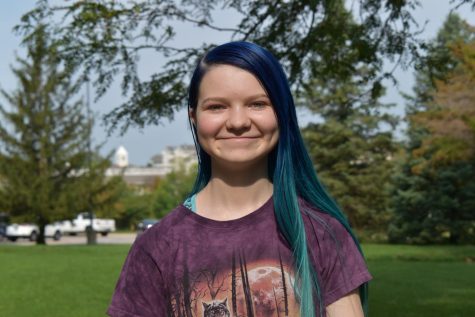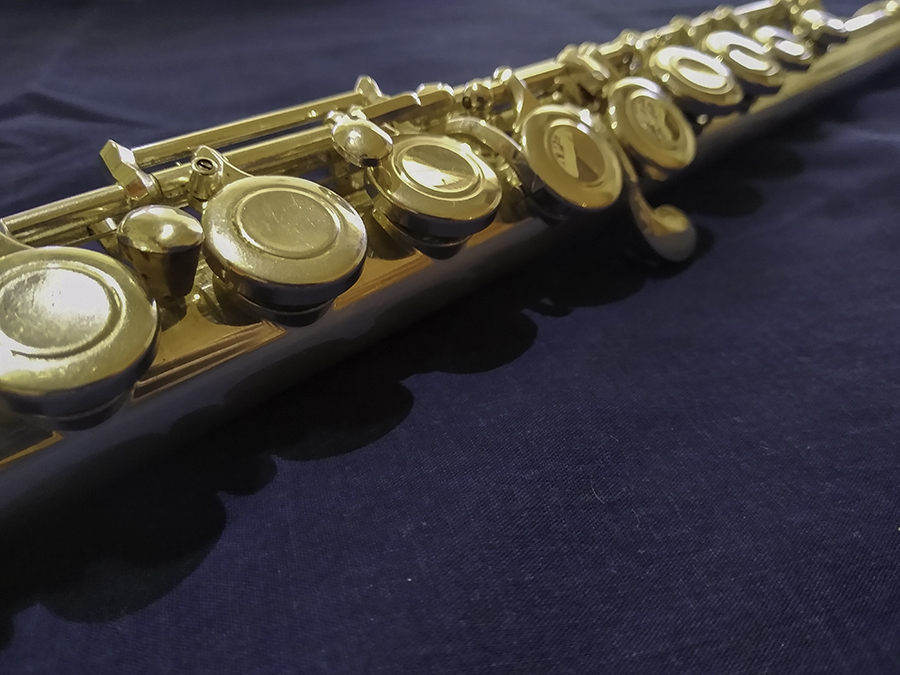All-State musicians selected amidst pandemic
Around 50 West High students were accepted into the All-State band, choir and orchestra this year through online auditions due to COVID-19.
West High musicians auditioned for All-State band, orchestra and choir online this year.
With the pandemic still a major threat, the All-State Musical Festival was canceled on Oct. 1. Students auditioned and were accepted into All-State, however, the process was changed to accommodate the constraints of COVID-19.
The All-State Musical Festival is an annual concert of Iowa high school musicians hosted by the Iowa High School Music Association (IHSMA). With the audition process starting as early as the end of July, students spend months preparing and practicing to get accepted into All-State. The accepted candidates, chosen in October, then get to showcase their talent in a concert of hundreds of students in November.
Auditions were submitted virtually on Oct. 21. The decision to go online with auditions was made towards the end of June. Students had to learn the process of recording themselves and uploading it, but many had previous experience doing so, and the music directors believe it’s a good skill to have.
“I think it was definitely the right thing to go ahead and hold the auditions,” said West High Band Director Rob Medd. “Students could still have that whole process of working on the music, getting prepared. The new process of doing video recordings is a really good skill to be able to have […] so I think they benefited from that process. And they certainly deserve the ability to be able to be designated as an All-Stater whether or not they have the festival.”
While it is beneficial to know how to record, following the strict rules for recording—what had to be recorded in one take, having a clock behind you, having the camera show the entire playing set up and much more—was a tiring process. Especially when students wanted their takes to be perfect.
“It is kind of annoying because every time you mess up you have to redo it,” said Yuning Shao ’24, an All-State violinist. “You have to take seven videos and it’s pretty grueling.”
Shao was one of the only West High freshmen to get into All-State this year. Being a freshman added another level of difficulty of not knowing what to expect because she hadn’t auditioned before. To prepare, she recorded trial videos of the different segments and then pieced them all together at the end.
“[Orchestra Director Jon Welch] had a whole list of what you had to do,” Shao said. “And it was really helpful because I really didn’t know what I was supposed to do.”
In a normal year, auditionees learn an entire song for choir, two to three etudes for band and around seven excerpts for orchestra. The band and orchestra also have to learn all 12 major scales. Then, on the day of auditions, the cuts of what the auditionees will play of each piece are released. This includes only two scales for band and orchestra, but this year they had to audition with all 12 scales.
“While it’s maybe not as stressful, I think it was a more difficult audition,” Welch said. “In terms of the audition, you probably don’t have the nerves or the jitters that you might get when you have to perform live. But having to record all of those scales and excerpts, just the amount of it is very intense, and I can hear the difference in students playing at how far they’ve come.”
The auditions were also different because the cuts of the pieces that students auditioned with were released two weeks in advance instead of on the day of auditions.
“The audition process this year was weird,” said Niyati Deshpande ’21, an alto who has auditioned and been accepted into All-State the past three years. “I don’t think anyone’s actually learned the whole song for each piece, we just learned those cuts.”
Normally, choir students audition in quartets that include one of each voice part: soprano, alto, tenor and bass. This year, all of the auditions were solo due to the aerosolization that occurs when singing.
“A lot of the things that the kids learn about ensemble skills and working together and improving their musicianship skills from a choral singing standpoint have been taken out,” said Choir Director David Hass.
Because of the constraint of Zoom and having to prepare for auditions online, each of the directors handled preparation differently. Haas and Luigi Enriquez, the other choir director, started out trying to have Zoom sessions but eventually found it was easier for students to submit videos of them singing and give them feedback on the videos.
Since each section can only have around 30 auditionees, the band and orchestra had to have local auditions to get the number of students down to 30. The band directors used these auditions to help prepare their students and then did the occasional check-in. Welch used the local auditions along with a few Zoom lessons during the students’ asynchronous time.
All of the directors lamented that they weren’t able to help their students as much as they wanted to.
“A lot of the responsibility is placed much, much more on the shoulders of the individual students this year,” Haas said.
The festival was canceled after it was announced that auditions would be held online. Students still received a certificate and a medal for getting into All-State, but there will be no formal celebration of their accomplishments. The cancellation was disappointing to many students, but it wasn’t surprising, due to the safety risks.
“It’s a shame, don’t get me wrong,” Welch said. “There are a lot of students, seniors that are just going to miss out on this opportunity. But I think that they made the right decision and it served its purpose … it gives folks a reason to practice and it gives them a reason to get better at their instruments.”
Without the quartets and the festival, many of the choir students found it hard to find the motivation to audition for All-State.
“Motivation was really hard, I’m going to be honest,” Deshpande said. “The thing that I find most fun about All-State is being in a quartet and rehearsing in a quartet and having fun with your quartet. But this year there was no quartet, so the motivation to actually get up and rehearse and learn the music was really not there.”
“We’re doing [All-State] to better ourselves and have better skills … but it’s hard not having something to look forward to,” Deshpande said. “It’s really cool to be like, ‘I’m in All-State this year,’ and get our certificates and our medals but without the big day it’s a little … less exciting.”
Haas worked to encourage the choir students to audition for All-State this year if they would have auditioned in a normal year, but he also didn’t want to pressure them into a commitment that they did not have the time or energy to do their best at.
“If they want to take part in improving themselves as musicians they absolutely should,” Haas said. “But I’ve also been careful not to apply too much pressure to those students who have a lot of other areas in their life that have been turned upside down and given them permission to say [that] this is not the year they want to audition for All-State.”
While the choir students had a hard time with motivation, it was a different experience for orchestra and band students who normally audition solo. With the freedom to practice around their own schedules and the time that the pandemic gave them, some of the students were even more motivated than normal.
“I could just tell at the beginning of the year … I didn’t really know what to anticipate, whether the students during COVID had let their instruments get away, but it was quite the opposite,” Welch said. “I can tell that students are very hungry for the opportunity to make music.”
Even with the new constraints making it more difficult to audition for All-State this year, those that did audition did not regret doing so.
“It really wasn’t a bad experience,” Deshpande said. “We still had Zoom calls with Haas and Enriquez, and the people who are doing it, we still tried to make it as fun of an experience as we could. It was just different.”
The auditions were just as difficult as normal, making the level of achievement for getting into All-State just as high as in previous years.
“For the students that have been accepted, I don’t think there’s an asterisk near it. I think that they put in all the work and they are All-State level,” Welch said.
Your donation will support the student journalists of West High School. Your contribution will allow us to purchase Scholarship Yearbooks, newsroom equipment and cover our annual website hosting costs.

(she/her) Bess Frerichs is the online managing and feature editor. As a senior, this is her third and final year on staff. She enjoys reading, writing...



